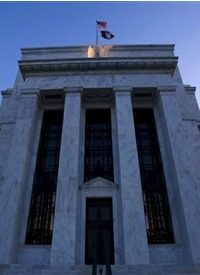
Introduced in February 2009, Congressman Ron Paul’s measure to have the Fed audited (H.R. 1207) has gained enormous support from his House colleagues. Our most recent check shows that 250 members have co-sponsored the bill whose full name is “The Federal Reserve Transparency Act.” While this number exceeds the 218 majority figure, it does not mean that the measure must be brought to the floor for debate and a vote. Both Speaker Nancy Pelosi (D-Calif.) and Majority leader Steny Hoyer (D-Md.) have power to block consideration of any House measure, an action that is quite likely from either in this case.
But there is an alternative. An infrequently employed House procedure involves having a majority of members approve what is known as a discharge petition, a parliamentary mechanism that would bypass the blocking capability of the House leaders. Congressman Paul has not yet initiated such a move. He has, however, been both pleased and surprised at the support his measure has already gathered, claiming that any steps taken to block further the desired audit will induce even more Americans to want one. It will also, he says, reflect ill on those who try in any way to stymie the opening up the Fed’s books by the General Accounting Office.
Over in the Senate, a companion measure (S. 604) has been introduced by Senator Bernie Sanders (I-Vt.). Co-sponsors to date include three GOP senators: DeMint of South Carolina, Crapo of Idaho and Vitter of Louisiana. Senator DeMint tried unsuccessfully on July 6 to amend the annual spending bill with a provision calling on the Government Accounting Office to audit the Fed and issue a report for public scrutiny.
DeMint’s measure, entitled “The Federal Reserve Sunshine Amendment,” encountered swift blocking by Democrat colleagues who claimed that adding a legislative matter to a spending bill violated Senate rules. The South Carolina senator pointed out to no avail that what was being deemed a violation regarding his measure had frequently been employed previously. He labeled the action “a double standard,” a gentlemanly way of saying an injustice was being perpetrated.
All across the nation, previously unaware Americans have been learning that the organization managing the nation’s monetary system has always operated in secrecy. They are also finding out who in Congress is blocking attempts to open the incredibly powerful Fed to public scrutiny. Ron Paul considers the support his measure has received a significant though partial victory. Continued blocking of the sought-after audit, he says, “only shows there must be something to hide.”
Correctly labeling Fed-created inflation “a hidden tax on all Americans,” Jim DeMint points out that the central bank will “create and disburse trillions of dollars” in the months ahead and “Americans want to know where the money has gone.”
Both of these congressional leaders deserve the thanks of the American people. Though not yet successful, they know that citizen pressure on members of both Houses for what they seek can indeed lead to achievement of their goal. So they ask that Americans of whatever political persuasion contact, or re-contact, their representative and senators to ask that secrecy at the Federal Reserve be ended.



